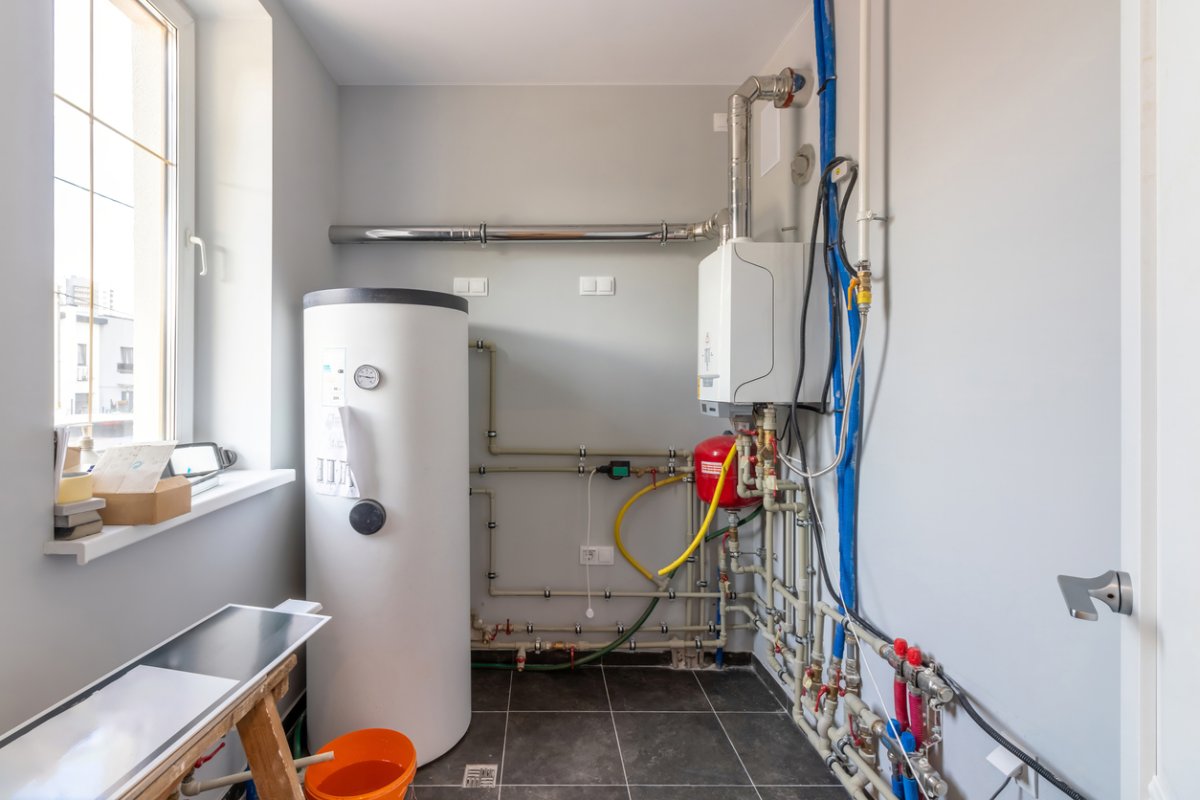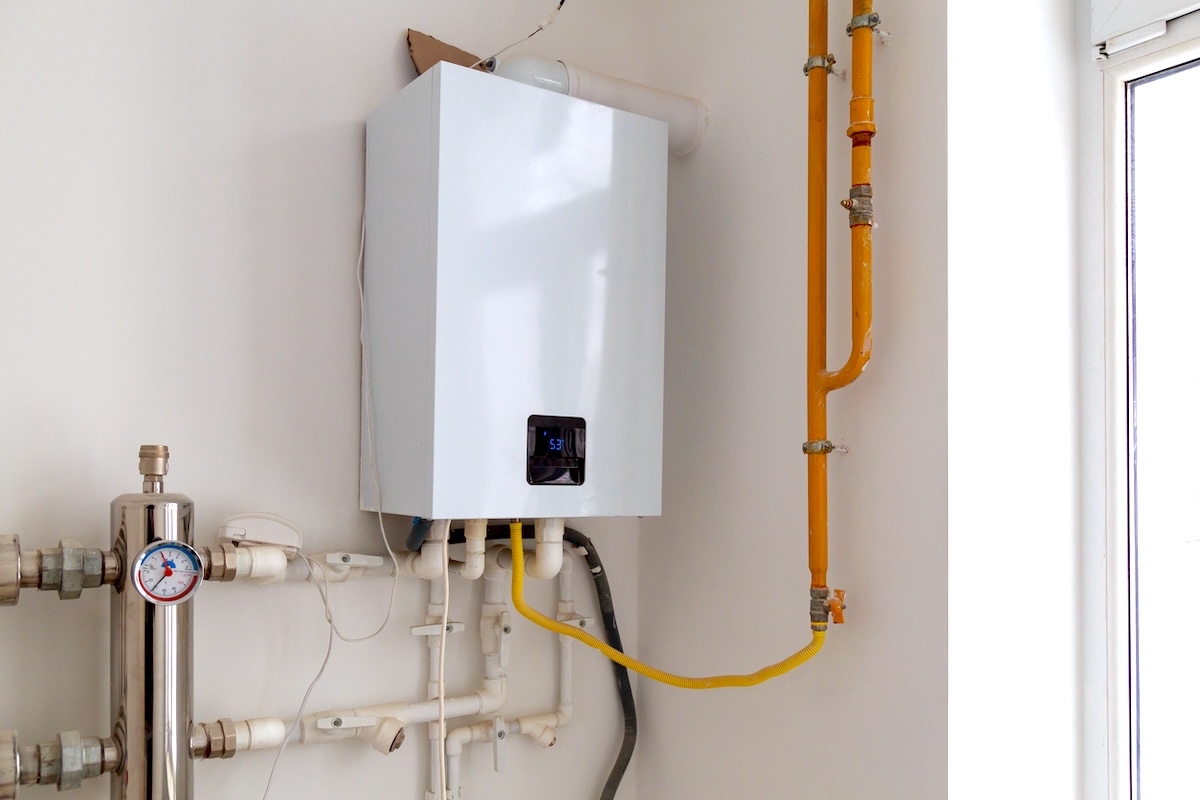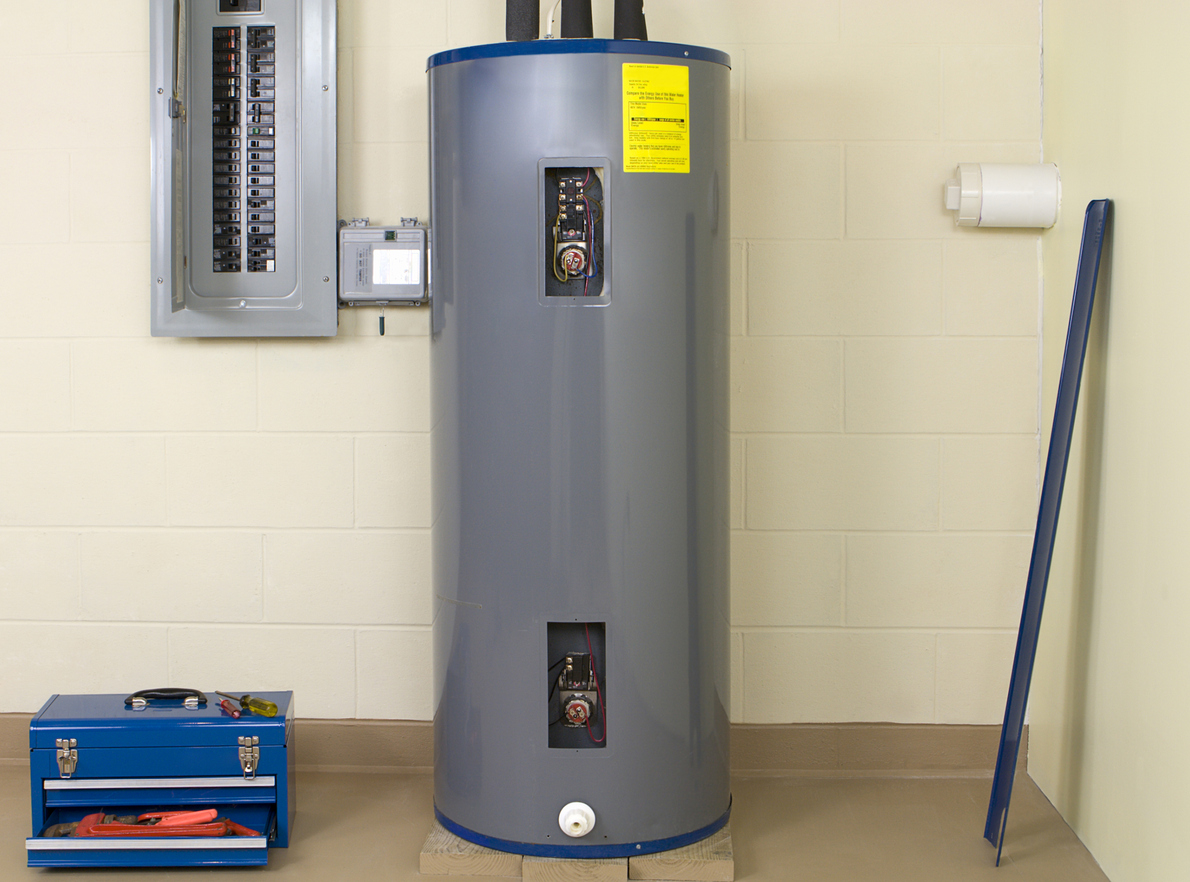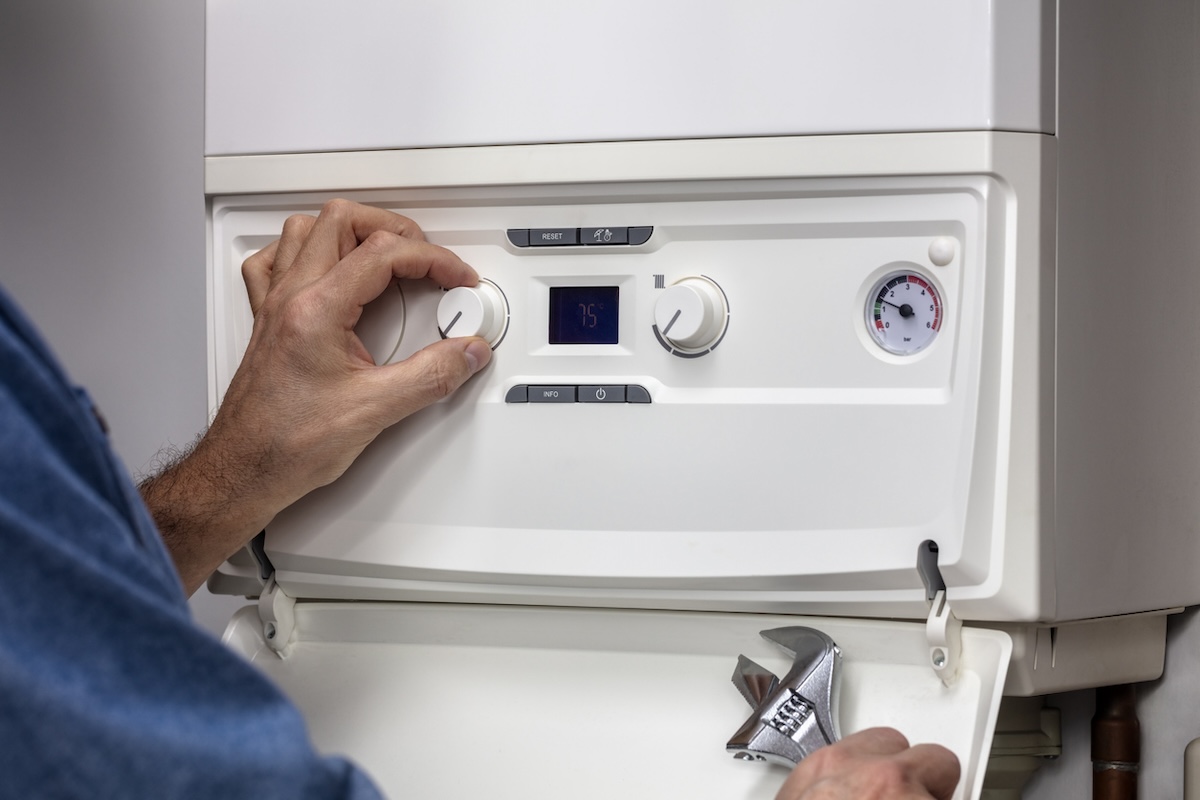

We may earn revenue from the products available on this page and participate in affiliate programs. Learn More ›
The overlap of boiler vs. water heater functionality in a home often leads to these two appliances being confused for one another. While steam or hot water boilers can be used to heat water for use throughout the home, they’re more commonly used to heat indoor air with a series of connected radiators.
Hot water heaters, meanwhile, are exclusively designed to heat water for use in faucets, fixtures, and appliances that use water. Tank and tankless water heaters warm incoming cold water before distributing that hot water throughout the house. There’s a bit more to know about the differences between a boiler and water heater, including some details on water heater vs. boiler maintenance.
RELATED: Can a Water Heater Explode? Yes—and Learn the 6 Biggest Warning Signs
A boiler heats spaces within a home, and it may also heat water.

Boilers are convenient heating appliances that have multiple potential functions, including:
- Heating water
- Central heating
- Power generation
A boiler’s primary purpose is to serve as a hot water boiler heating system, which rapidly heats up incoming cold water. That heated water is then circulated through a series of pipes and radiators in order to heat up the home.
Some heating boilers may heat water up enough that it turns to steam, which is then pumped through the radiators and radiator lines to warm up indoor air. Steam boilers are more commonly used in commercial or industrial settings, while hot water boilers are better for residential properties.
When installed as a boiler water heater, this appliance can rapidly heat up water that passes through a series of copper tubes and deliver it to faucets, showers, tubs, and water-using appliances. Unlike water heaters, boilers do not store water.
There are low-pressure or high-pressure boilers to pick from, depending on the size of the space being heated. Low-pressure boilers use up to 15 pounds per square inch (PSI), which is generally more than enough for a residential property. (For this reason, low-pressure boilers may also be referred to as residential boilers.) High-pressure boilers are usually installed in commercial or industrial properties and can reach levels of up to 100 PSI.
Boilers can be more energy-efficient and quieter than furnaces, making them a great option for home heating. They rapidly heat water using electricity, natural gas, propane, or heating oil as fuel. The efficiency and ongoing cost of a given boiler system depends on the fuel source being used, so take some time to research local utility costs before deciding on a boiler system.
A water heater warms a home’s water supply.

Unlike boilers, water heaters are only designed to heat incoming cold water to an adjustable set temperature.
Understanding how a water heater works is relatively simple: Cold water flows into the water heater tank, where it’s heated up by an element located at the tank’s base. Once the water in the tank reaches a set temperature, the water heater stops heating the water. This water is then stored in the insulated storage tank until a hot water line carries to a fixture or appliance.
There are also tankless water heaters, which quickly heat cold water as it flows through the unit, allowing the hot water to be used on-demand, instead of storing the water indefinitely.
Tank and tankless are just two types of water heaters available; homeowners can also invest in heat pump water heaters. These work by pulling in heat from the surrounding air and transferring it to heat water stored in a tank. Heat pump water heaters are generally powered by electricity or natural gas, though some smaller models may use propane or solar energy to heat water.
It costs more to install a boiler than a water heater.
The cost to install a boiler is generally higher than the installation price of a water heater, though the exact cost can vary based on home size and the type of boiler system being installed. Similarly, the cost of water heater installation varies based on water heater type and fuel source.
On average, a new boiler system for a typical 1,500-square-foot home can cost around $5,700. Assuming a homeowner installs a water heater themselves, they cost around $600 to $800 on average. (Tankless water heaters cost more at an average of $2,500, not including possible installation costs.)
Standard steam boiler systems last for 25 or more years, while a combination water heater boiler may only last 10 to 15 years. The average tank water heater lasts about 6 to 10 years before needing to be replaced, and tankless water heaters last longer at up to 20 years.
RELATED: The Best Water Heater Brands
Both systems require annual maintenance.

In order to keep the home functioning properly, it’s necessary to stay on top of regular system maintenance. Boilers and water heaters both require annual maintenance to help ensure that the appliances operate efficiently and effectively. Visual inspections can identify obvious problems, like leaks, but homeowners may need professional help to conduct other system maintenance, like flushing, draining, or lubricating.
Typical boiler maintenance includes:
- Visual inspections conducted by checking the exterior of the boiler for leaks or other problems
- Lubricating the circulating pumps to reduce wear and tear
- Flushing the boiler to remove built-up sediment and debris
- Conducting a monthly safety valve check to ensure the security of the system
- Making repairs as needed
Typical water heater maintenance includes:
- Visual inspection conducted by checking the exterior of the water heater for leaks or other problems
- Checking the pressure relief valve to ensure it is working properly
- Draining and flushing the water heater to remove sediment and debris
- Operating the valves to prevent them from seizing
- Making repairs as needed
While a hot water supply is required by the International Residential Code, not every home needs a boiler.

When weighing the benefits and drawbacks of boilers vs water heaters, it’s worth noting that in the International Residential Code, a hot water supply is a requirement. This means that a home must have an appliance that is capable of heating water for bathing, washing, and culinary purposes.
Generally, a water heater is more affordable and easier to install and maintain, making it the most common option. Given that a home can be heated with a furnace, instead of a boiler, not every home needs a boiler. However, if the home does not have a furnace, then it may be worth it to invest in a combination water heater boiler system that can both heat the home and heat the water for use throughout the home.
Before deciding between a boiler vs water heater, carefully consider the needs of the home. Boilers are expensive and difficult to install, but they can be a great, long-lasting option if the home doesn’t currently have a dedicated heating source. These systems can also be used to heat water for use throughout the home. Water heaters are a more affordable choice that can be installed with relative ease, though these appliances cannot function as a heating source for the property.
RELATED: Solved! Who Installs Water Heaters, and How Do I Get a New One Installed?
About the Author
Timothy spent his post-secondary education years working in the plumbing trade while completing degrees in English literature and psychology. He took on a position in project management that ended up lasting 10 years before segueing into a career as an expert writer. As a project manager, Timothy had a wide range of work that included plumbing, carpentry, and electrical work, as well as restoration work, emergency response, safety audits, and contract negotiation.
In his work for BobVila.com, he has written a number of how-to articles related to yard maintenance, vehicle repair, and home renovation, not to mention a wide variety of buying guides and articles on DIY projects.
